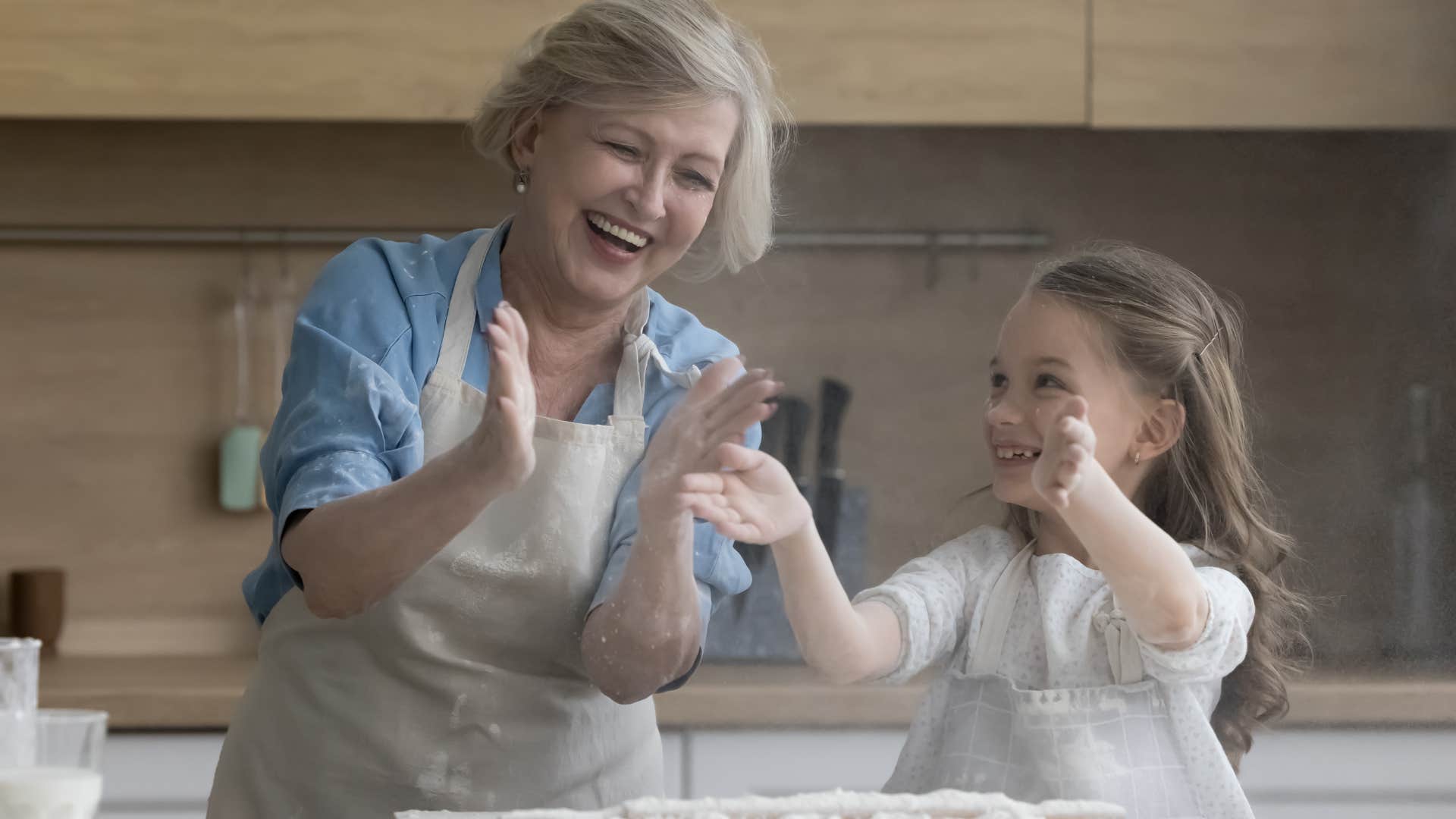11 Things People With Common Sense Stop Caring About After A Certain Age
They're focused on the things that matter most.
 VH-studio | Shutterstock
VH-studio | Shutterstock While it's true that some research, like one PNAS study, argues that common sense is generally an abstract concept — where people agree on certain shared and universal beliefs — that's also rare, there are certain traits that some people grow into with age that give them a framework for making better, more personal, and intuitive decisions. They grow to be more self-assured, meaning they're less swayed by traditional social norms, expectations, and pressures that others lacking common sense may fall victim to.
Many of the things people with common sense stop caring about after a certain age protect their sanity as they face getting older, navigating responsibilities, and dealing with their personal relationships. They care less about appeasing others and "fitting in," and more about crafting a life and routine that suits their best interests.
Here are 11 things people with common sense stop caring about after a certain age
1. Other people's opinions
 DimaBerlin | Shutterstock
DimaBerlin | Shutterstock
According to psychologist Jennifer Koehler, many less confident and competent people fall victim to the "conformity trap" — giving up their own personal interests and identities for the sake of conforming with the "norm" — at the expense of their psychological health, relationships, mood, and general well-being.
However, other people's opinions and expectations are something that people with common sense stop caring about after a certain age. They don't want to "fit in," but rather live a life full of their own favorite things, people, and priorities.
Even if it may seem like common knowledge to prioritize the things you like, the conformity trap and unique societal pressures to conform are nuanced. They prey not only on people lacking common sense, but also those who may fear rejection, miss out on feelings of belonging and community, or feel consistently insecure in their identity.
2. Societal expectations
 OlgaLucky | Shutterstock
OlgaLucky | Shutterstock
While they may still find value in the hard work of their career or crafting fulfilling family relationships, many of the more toxic societal expectations people are held to early in life — like dressing a certain way, following misguided principles of professionalism, or even trying to look "youthful" later in life — become less important and persuasive with age.
Social expectations and traditional norms are one of the things people with common sense stop caring about after a certain age, because they're less concerned with appealing to the masses and more interested in promoting their own happiness and well-being.
3. Using social media for validation
 simona pilolla 2 | Shutterstock
simona pilolla 2 | Shutterstock
People who consistently rely on social media for validation and attention not only put themselves at risk for safety concerns from oversharing, they also never truly address the root cause of their insecurities, according to psychologist Bonnie Zucker.
They continue to post more and more intimately about their lives, with the hope that they'll feel a sense of connection or gain validation from others, sparking a cycle of disappointment, low self-worth, and external validation-seeking behaviors.
However, using social media for validation is one of the things people with common sense stop caring about after a certain age. They're happier feeding into their intentional relationships and using social media as a form of community, communication, or entertainment, rather than fulfillment.
4. Competing with others
 insta_photos | Shutterstock
insta_photos | Shutterstock
While challenging ourselves and setting higher standards for our work is a positive aspect of "competing" with others and occasionally comparing ourselves, living in a state of constant jealousy and competition with others isn't what life is about. Not only does it wreak havoc on relationships, but it also tends to promote low self-worth and disappointment.
That's why it's one of the things people with common sense stop caring about after a certain age. Especially for women, who are often criticized and judged for showing competitive behaviors, there's a lot more value in the process of crafting personal goals, framing your hard work in alignment with your own lifestyle, and prioritizing your needs than trying to compete with others for success, attention, money, or validation.
5. Chasing perfection
 fizkes | Shutterstock
fizkes | Shutterstock
Alongside societal pressures to succeed and to "be the best" at everything you do, it's not surprising that many people develop perfectionist attitudes early in life. Whether it's in their careers, at home with partners, or even crafting personal routines, they sabotage their mental health, self-esteem, and relationships by chasing standards of success that are impossible to achieve.
That's why perfectionism is one of the things people with common sense stop caring about after a certain age. They're not only self-assured and aware enough to craft goals that they can actually achieve, but they also stop feeding into the cycle of disappointment and shame that comes with chasing perfection all of the time.
6. Gossip
 Ground Picture | Shutterstock
Ground Picture | Shutterstock
While drama can be entertaining and gossip can sometimes be bonding for the average person, people with common sense don't indulge in it as much with age, understanding the resentment, disconnection, and self-esteem issues that tend to follow.
When they have a concern, they use their communication skills to express it. When they're feeling jealous, they look inward and acknowledge those emotions, rather than turning to a friend to speak negatively about someone else. Even in situations where everyone else is consuming drama and sharing gossip, they're not afraid to create distance and walk away for the sake of their own mental health.
7. Holding onto old friendships
 Monkey Business Images | Shutterstock
Monkey Business Images | Shutterstock
According to a study from the University of Michigan, friendships and platonic relationships become more important as we age — promoting healthier aging behaviors, community, and generally better mental health. However, when older individuals hold onto relationships that no longer serve them or add value to their lives, it can spark more harm than good.
Even if they seem subtly annoying regularly, toxic friendships can negatively impact a person's health, aging, and well-being. That's why people with common sense stop caring about holding onto toxic friendships as they get older, even if it means needing to have hard conversations, set boundaries, and walk away.
Rather than constantly grappling with the guilt of making space for them, even at the expense of personal well-being, mood, and mental health, these people with common sense instead prioritize themselves.
8. Being right all the time
 Inside Creative House | Shutterstock
Inside Creative House | Shutterstock
Being right all the time is not a priority for people with common sense after a certain age. They're not trying to "win" arguments, prove other people wrong, or even compete with people by avoiding accountability and asking for help.
Instead, they're willing to learn from other people, ask for help, and admit when they've made mistakes. They grow in the face of their perceived flaws, even if it means actively listening and appreciating other people's thoughts and insights.
Being willing to admit you don't know something and learn from someone else isn't just a sign of a person with common sense, but true intelligence and competency. They're not afraid to admit they made a mistake or that they need help, because they don't equate these things with failure, but instead with growth opportunities.
9. Their appearance
 voronaman | Shutterstock
voronaman | Shutterstock
According to a study from Frontiers in Psychiatry, people become less concerned with how they look — whether it's their body image or appearance in accordance with social beauty standards — as they get older. They're not interested in putting their mental health, financial well-being, or identity on the line for the sake of fitting in, so they put less time into crafting a curated look, aesthetic, or appearance, especially when they have more fulfilling things to spend their time on.
People who lose interest in their appearance as they get older may also be comfortable with aging and embracing their natural appearance with age. Even if it feels like common sense for better mental health, oftentimes, pressures from toxic beauty standards and social norms take over for the average person.
10. Regretting their mistakes
 Lomb | Shutterstock
Lomb | Shutterstock
The quickest way to live stuck in the past and miss out on the joy of the present moment is to overthink regrets. If you're always thinking about what you could've done differently two decades ago, you're missing out on opportunities for growth, love, and acceptance today.
That's why regrets are one of the things people with common sense stop caring about after a certain age. They're self-aware enough to recognize that mistakes are inevitable and self-assured enough to forgive and give grace to themselves.
11. Control
 Krakenimages.com | Shutterstock
Krakenimages.com | Shutterstock
People who are constantly trying to control their lives, other people's behavior, and relationships often end up feeling more anxious, uncertain, and unhappy. It's not because they're unsuccessful, either; it's because it's impossible to control these things.
You have the power of how you respond to people and take action after a life event, but in most cases, controlling everything is impossible and a recipe for disconnection, struggle, and dysregulation. That's why it's one of the things people with common sense stop caring about after a certain age. They'd prefer to focus on what they can control and promote a more stable mental state than trying to control it all.
Zayda Slabbekoorn is a staff writer with a bachelor's degree in social relations & policy and gender studies who focuses on psychology, relationships, self-help, and human interest stories.

